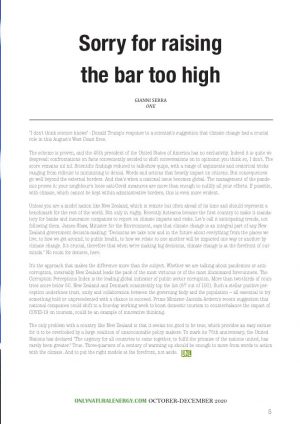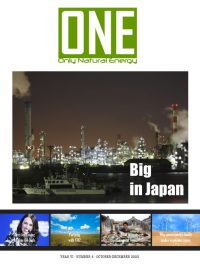 “I don’t think science knows” – Donald Trump’s response to a scientist’s suggestion that climate change had a crucial role in this August’s West Coast fires.
“I don’t think science knows” – Donald Trump’s response to a scientist’s suggestion that climate change had a crucial role in this August’s West Coast fires.
The scheme is proven, and the 45th president of the United States of America has no exclusivity. Indeed it is quite widespread: confrontations on facts conveniently avoided to shift conversations on to opinions: you think so, I don’t. The score remains nil nil. Scientific findings reduced to talk-show quips, with a range of arguments and oratorical tricks ranging from ridicule to minimizing to denial. Words and actions that heavily impact on citizens. But consequences go well beyond the external borders. And that’s when a national issue becomes global. The management of the pandemic proves it: your neighbour’s loose anti-Covid measures are more than enough to nullify all your efforts. If possible, with climate, which cannot be kept within administrative borders, this is even more evident.
Unless you are a model nation like New Zealand, which is remote but often ahead of its time and should represent a benchmark for the rest of the world. Not only in rugby. Recently Aotearoa became the first country to make it mandatory for banks and insurance companies to report on climate impacts and risks. Let’s call it anticipating trends, not following them. James Shaw, Minister for the Environment, says that climate change is an integral part of any New Zealand government decision-making: “Decisions we take now and in the future about everything from the places we live, to how we get around, to public health, to how we relate to one another will be impacted one way or another by climate change. It’s crucial, therefore that when we’re making big decisions, climate change is at the forefront of our minds.” No room for deniers, here.
It’s the approach that makes the difference more than the subject. Whether we are talking about pandemics or anti-corruption, invariably New Zealand leads the pack of the most virtuous or of the most illuminated forerunners. The Corruption Perceptions Index is the leading global indicator of public sector corruption. More than two-thirds of countries score below 50. New Zealand and Denmark consistently top the list (87 out of 100). Such a stellar positive perception underlines trust, unity and collaboration between the governing body and the population — all essential to try something bold or unprecedented with a chance to succeed. Prime Minister Jacinda Ardern’s recent suggestion that national companies could shift to a four-day working week to boost domestic tourism to counterbalance the impact of COVID-19 on tourism, could be an example of innovative thinking.
The only problem with a country like New Zealand is that it seems too good to be true, which provides an easy excuse for it to be overlooked by a large coalition of unaccountable policy makers. To mark its 75th anniversary, the United Nations has declared “The urgency for all countries to come together, to fulfil the promise of the nations united, has rarely been greater.” True. Three-quarters of a century of warming up should be enough to move from words to action with the climate. And to put the right models at the forefront, not aside.
Gianni Serra





